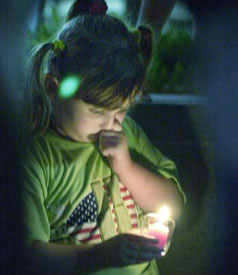
|  |  |  Editorials | Opinions | September 2008 Editorials | Opinions | September 2008  
Reflections on 9/11
 Reverend Jesse L. Jackson - Tribune Media Services Reverend Jesse L. Jackson - Tribune Media Services
go to original


| | A young girl holds a candle at a vigil, on the one-year anniversary of 9/11, in 2002. Reverend Jesse L. Jackson asks Americans to honor the victims of 9/11 by "revising our wrong-headed strategy" when it comes to the threat of terrorism. (September 11 News | | |
September 11, seven years later. It is an anniversary that we should mark with prayer, with lowered voices and sober reflection. September 11 was the most serious attack on America since Pearl Harbor. We must not forget.

But bluster is not remembrance. We must take clear stock of where we are and what we must do, for much has been lost over these last seven years.

Seven years ago, the world rallied to our side. "Nous sommes tous Americans" - we are all Americans - read the headlines in French newspapers. Our allies joined the attack on al Qaeda and its Taliban allies in Afghanistan. We enlisted local allies to help lead the successful attack. Al Qaeda's leaders fled to the mountainous territories on the Pakistan border. The UN nations joined in collective effort to identify and track down those committed to terror.

But rather than staying focused on that threat, America chose instead to invade Iraq, driven by the hubris, fears and grudges of the Bush administration. That war of choice has been one of the worst debacles in our history. Every assumption, every argument justifying it turned out to be wrong. There were no weapons of mass destruction. Saddham Hussein was an opponent of, not an ally of the religious extremists of al Qaeda. The war and consequent occupation was not financed by Iraqi oil money.

And the costs have been staggering. We squandered the support of our allies. We suffered over 30,000 casualties and still counting. We wasted over $1 trillion dollars, with the direct costs rising at more than $10 billion a month. We stained our reputation in Abu Ghraib and Guantanamo. Our scorn for international law was echoed by Putin in Georgia. We strained our own military. Our invasion strengthened Iran's hand in the region. And it weakened our support for the fledging government in Afghanistan, allowing al Qaeda, according to US intelligence reports, to reconstitute itself and pose once more a serious threat of attack on the US and its allies. Now, al Qaeda and its Taliban allies threaten not just Afghanistan, but Pakistan itself, a country that, unlike Iraq, really does possess nuclear weapons.

The whole notion of the war on terror, a report by the conservative Rand Corporation concludes, has been counter-productive. It inflates our enemies, providing them with global credibility, and it distorts our task. The real job of fighting al Qaeda - now a metastasized network of extremist cells whose greatest strength is the willingness of some to commit suicide - is overwhelmingly a matter of intelligence gathering and cooperation, of police investigation and tracking, of disrupting financial and travel arrangements, and of course, of winning a global conflict of ideas, painting them not as a global behemoth which they are not but as the extremists that they are.

And we ignored Dr. King's realization that a society focused on war abroad would be less able to deal with its own problems at home; that the bombs dropped on foreign battlefields would explode also in the neglect of America's cities. If we had invested that $1 trillion in conservation and new energy, we would have generated jobs and growth here at home, made ourselves less indebted abroad and less dependent on foreign oil. We surely would have been better able to deal with the economic downturn we now face.

The current bluster about "winning the war" ignores all this. It's hard to proclaim victory in a war that should never have been fought. And in fact we're a long way from a "victory" in Iraq, if that is defined as President Bush and John McCain say, as leaving behind a stable, democratic government that is a secure American ally. Even this week, General Patraeus has suggested delaying further troop drawdowns. The Shiite dominated government is aggravating, not solving the political divide with the Sunni tribes that have helped to create the current decline in violence. The economy is still a shambles. The Kurds are still seeking independence. If we stay until these tensions are settled, we will stay for years, if not decades.

Will we get some straight talk on Iraq? Will we fundamentally revise our wrong-headed strategy on the threat posed by al Qaeda? At their convention, Republicans, as in 2004, sought to make the war a partisan club, and reduce the debates to taunts. Americans deserve better. But it will be up to citizens to demand this of their leaders and of the media. |

 |
|  |



